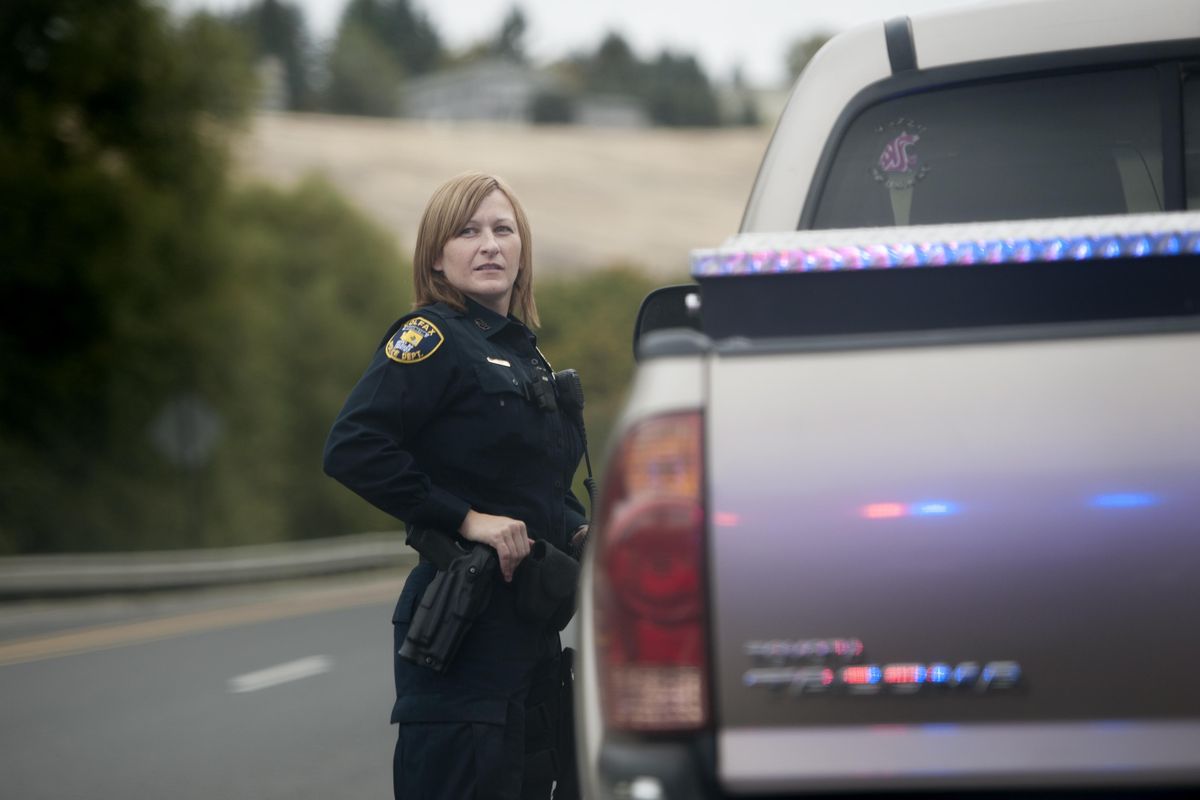Colfax speed trap the ultimate Cougar-catcher

Mike DeVleming grew up a diehard Cougar fan, making the trek from Spokane to Pullman for home games since he was a boy riding with his dad.
And for just as long he’s thought of Colfax as a speed trap.
“There isn’t a Cougar alive who’s willing to go 1 mile over the speed limit in that town on a game day,” said DeVleming, the former mayor of Spokane Valley. He was pulled over himself when he was much younger, driving to a game with friends.
Being ticketed for speeding can put a damper on game-day spirits, but DeVleming noted, “It won’t happen if you obey the speed limit.”
Colfax police Officer Jaelene Bryan has heard nearly every excuse and accusation possible when she pulls over speeders on their way to or from a Cougar or Vandals home game.
“It does kind of hurt when people say we are just a speed trap. It’s not true,” Bryan said, while sitting in her cruiser watching southbound traffic before WSU’s home game against the Idaho Vandals two weeks ago.
On a big Cougar game day, the number of cars and trucks traveling through Colfax jumps to nearly 40,000 from the regular daily count of less than 10,000.
Bryan’s 12-hour shift began at 6 a.m., and on game day, she was the only officer on duty; the police chief and the one other officer that make up the Colfax Police Department worked the football game.
Traffic picked up around 8 a.m., and Bryan parked her cruiser on the hill at the south end of town.
“I like to be very visible,” Bryan said. “I’m not sneaky about it. Everyone can see I’m here.”
The speed limit through downtown Colfax is 25 mph – that’s 35 mph below the speed limit on Highway 195. But drivers have to be going significantly faster than the posted speed limit to be pulled over by Bryan.
If drivers visibly slow down, she often lets them pass.
On a typical day, she will write two to three speeding tickets. On game days, she will ticket up to 10 drivers. And the cost isn’t cheap: drivers going 1 mph to 9 mph over the speed limit face a $125 fine. Drivers traveling 10 mph to 14 mph above the posted limit face a $136 fine.
“They have to be going 10 miles or more over before I start writing them up,” Bryan said. “By the time I walk up to the car, I’ve made up my mind if they are going to get a ticket or not.”
For years, Valoree Gregory, the executive director of Colfax’s Chamber of Commerce and Downtown Association, commuted from Steptoe to her job as a WSU fundraiser in Pullman.
“It was always the first thing people said: ‘Watch out in Colfax,’ ” Gregory said, “but in the 15 years I drove through town, I never got pulled over.”
Gregory said there’s a big problem with drivers running red lights at the crosswalks downtown and that people in general drive too fast.
“I walk downtown a lot and I see it,” Gregory said. “People just need to slow down.”
Traffic north to Spokane after a home game is often heavier than in the morning, because everyone leaves Pullman at the same time.
Jeff Jordan, a retired Spokesman-Review editor and a lifelong Cougar fan, has made that drive back to Spokane countless times.
He said Colfax is a bottleneck.
“Of course, half the time the Cougs have lost and you are really pissed off,” Jordan said. “And then you get stuck in traffic for an hour listening to the post-game shows and stew over the game.”
Jordan acquired one Colfax speeding ticket over the years.
“I accelerated a little too fast on my way out of town,” Jordan said. “They will really nail you there on that hill.”
Some Cougar fans take Highway 27 south from Spokane, through Tekoa and Palouse, but law enforcement along that route have an innovative way of slowing game-day traffic.
In Garfield, “They have a fake cop car sitting there just as you hit town,” Jordan said. “It slows you right down, every time.”
Bryan, the Colfax police officer, agrees that post-game traffic is the worst because people are tired and want to go home.
“Yes, we do pull people over if they go to fast,” Bryan said. “But most get off with a warning. It’s not a punishment – that’s an education.”
